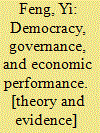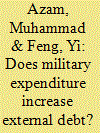| Srl | Item |
| 1 |
ID:
050012


|
|
|
|
|
| Publication |
Cambridge, MIT Press, 2003.
|
| Description |
xiii, 383p.
|
| Standard Number |
0262062356
|
|
|
|
|
|
|
|
|
|
|
|
Copies: C:1/I:0,R:0,Q:0
Circulation
| Accession# | Call# | Current Location | Status | Policy | Location |
| 047420 | 338.9/FEN 047420 | Main | On Shelf | General | |
|
|
|
|
| 2 |
ID:
155299


|
|
|
|
|
| Summary/Abstract |
This article empirically explores the effect of military spending on external debt, using a sample of ten Asian countries over the years from 1990 to 2011. The Hausman’s test suggests that the random-effects model is preferable; however, both random-effects and fixed-effects models are used in this research. The empirical results show that the effect of military spending on external debt is positive, while the effects of foreign exchange reserves and of economic growth on external debt are negative. For developing countries caught in security dilemma, military expenditure often requires an increase in external debt, which may affect economic development negatively.
|
|
|
|
|
|
|
|
|
|
|
|
|
|
|
|
| 3 |
ID:
076768


|
|
|
|
|
| Publication |
2006.
|
| Summary/Abstract |
Political capacity is a necessary condition for the growth and rise of any leading nation. History has witnessed the augmentation and decline of great powers concomitant with the ebbs and flows of their political capacity. This essay reviews the concept of political capacity and discusses the measure of relative political capacity. It further applies the concept and measure of such capacity to China where building government capacity seems to dovetail with the nation's policy priorities. China's political capacity decreases when economic reforms are the driving force and increases when political campaigns carry the day. Finally, a cross-province analysis of political capacity is conducted revealing that provinces located in the central part of China tend to have stronger governments than are found in other areas. This finding is consistent with the observation of historians that thousands of years of meteorological and geographic forces have shaped state-building in Central China.
|
|
|
|
|
|
|
|
|
|
|
|
|
|
|
|